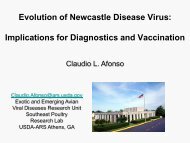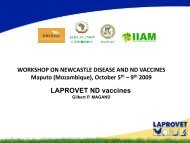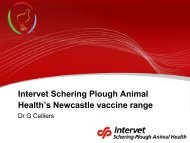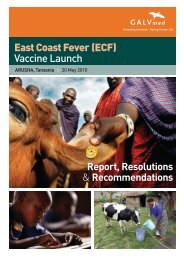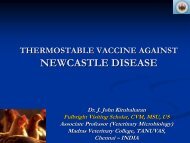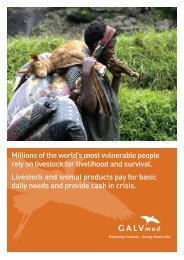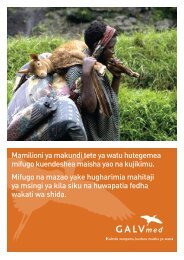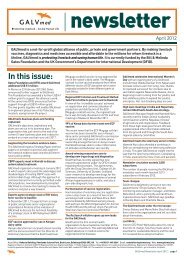A Path to Prosperity New Directions for African Livestock
GALVmed Impetus Strategy Paper
GALVmed Impetus Strategy Paper
- No tags were found...
Create successful ePaper yourself
Turn your PDF publications into a flip-book with our unique Google optimized e-Paper software.
ARD in collaboration with AU/IBAR, ILRI and FAO<br />
is leading a BMGF-funded ef<strong>for</strong>t <strong>to</strong> improve the<br />
collection and access <strong>to</strong> accurate lives<strong>to</strong>ck data<br />
that can support market-driven opportunities <strong>for</strong><br />
smallholder lives<strong>to</strong>ck keepers.<br />
Consultative Group on International<br />
Agricultural Research (CGIAR)<br />
The International Lives<strong>to</strong>ck Research Institute (ILRI)<br />
heads up CGIAR’s lives<strong>to</strong>ck work. It aims <strong>to</strong> bring<br />
high-quality research and capacity building <strong>to</strong> bear<br />
on poverty reduction in the developing world. ILRI<br />
works in seven key areas:<br />
> Vaccine and diagnostic technologies <strong>for</strong> orphan<br />
animal diseases;<br />
> Animal genetic resources;<br />
> Climate change;<br />
> Emerging diseases;<br />
> SPS and market access within broader market<br />
opportunities <strong>for</strong> the poor;<br />
> Sustainable intensification in smallholder<br />
crop-lives<strong>to</strong>ck systems.<br />
ILRI has partnerships with all the above mentioned<br />
organisations and national agricultural research<br />
centres. Under the recent re<strong>for</strong>m programme of<br />
the CGIAR, ILRI will be working on a series of<br />
“mega programmes,” and developing its own food<br />
security programme <strong>for</strong> lives<strong>to</strong>ck and fish sec<strong>to</strong>rs.<br />
This will focus on the following areas:<br />
> Increasing productivity in small-scale lives<strong>to</strong>ck<br />
and fish production and marketing systems;<br />
> Increasing access <strong>to</strong> af<strong>for</strong>dable animal source<br />
foods (ASF) <strong>to</strong> enhance food and nutrition<br />
security <strong>for</strong> the poor, especially women<br />
and children;<br />
> Enable participation in, and access <strong>to</strong>, pro-poor<br />
production and marketing systems that promote<br />
uptake of productivity-enhancing technologies<br />
and increase value generation, with emphasis on<br />
addressing current gender disparities;<br />
> Secure household and community lives<strong>to</strong>ck and<br />
fish assets <strong>for</strong> sustained livelihoods, and<br />
conserve lives<strong>to</strong>ck, fish and <strong>for</strong>age/fodder<br />
biodiversity as public good assets that will<br />
provide genetic diversity <strong>for</strong> continued growth<br />
and adaptation;<br />
> Protect the natural resource base and its ability<br />
<strong>to</strong> continue providing ecosystem services;<br />
> Strengthen capacity <strong>to</strong> enable public and private<br />
sec<strong>to</strong>r ac<strong>to</strong>rs <strong>to</strong> support and exploit appropriate<br />
research and development ef<strong>for</strong>ts <strong>for</strong> sustainable<br />
intensification of small-scale lives<strong>to</strong>ck and fish<br />
production, and marketing systems that provide<br />
equitable benefits <strong>to</strong> men and women.<br />
The Impetus Strategy Paper I Page 59



